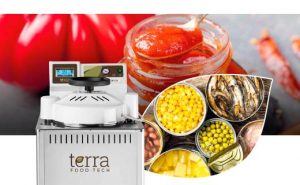Are you making gourmet canned food and/or prepared dishes?
Then you know that pasteurization or sterilization is necessary. Without this final step, your canned food might become a public health risk and you will not have the authorization to sell it.
Pasteurization or sterilization? Aren’t they the same?
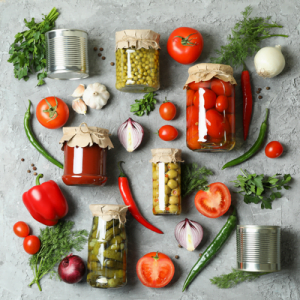
- Pasteurization consists of heating food at temperatures between 60°C-100ºC for a few minutes or even seconds. By not being so severe, it is more respectful towards organoleptic properties of ingredient but it does not destroy all microorganisms. For this reason, it requires refrigeration at all times and the expiration date to be shorter.
- Sterilization, however, exposes canned food to temperatures above 100°C for a certain period of time. This technique is somewhat more severe, but it completely eradicates all microorganisms and spores. Hence it allows for a much longer preservation time, without the need for a cool chain and allows storage at room temperature.
When packaging food, you should keep in mind that glass jars with screw-on lids require an inner empty space at the top. Failing to do so, may prevent hermetic sealing or even cause the container to break.
Autoclaves for start-ups and microentrepreneurs
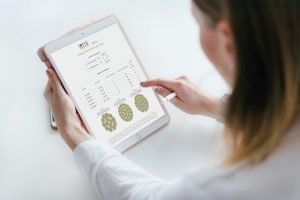
First, it can be useful to Calculate your productive capacity per cycle or the amount of containers that you can process per cycle according to each model of our autoclaves. Therefore, TERRA Food-Tech offers a free online calculator.
Le vertical or upper load autoclaves have a capacity of 33 to 175 litres and are designed for entrepreneurs, restaurateurs, farmers and chefs to cook, pasteurize and/or sterilize all kinds of canned foods and prepared dishes.
Other technical features of the autoclaves include:
- Respect for organoleptic and nutritional characteristics of the final product.
- Guarantee compliance with safety and hygiene laws for canned and packaged food.
- Suitable for many types of containers: cans, jars, semi-rigid trays, bags or pouches.
- Very straightforward installation — only requires 1 water input, 1 drain and 1 power connection.
- Easy to use program with a coloured tactile display, the ability to save up to 50 programs and the possibility to save default values for elaborating up to 50 different products.
- Programmable counterpressure and refrigeration to avoid breaking or deformation of containers.
- Security measures: safety valve and thermostat; door blocking system and open-door alarm; pressure and water level sensors; thermal protection around the lid; and a bodywork that protects the sterilization chamber.
- Multiple accessories for all kind of projects: basket elevation crane; customizable stainless steel trays and baskets; lid and semi-rigid containers hole punching ki; etc.
Thus, if you are thinking of making your own gourmet preserves and/or packaged ready-to-eat meals, turn to a professional autoclave like ours. All its features will make your work much easier and will allow perfect control of the entire process.
You already have your recipe, but need additional tests to check the shelf life of your product before launching it?
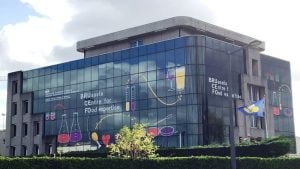
Faites tester vos produits, quel que soit votre type d'emballage.
L'autoclave de Terra Food Tech peut stériliser et pasteuriser toutes sortes de produits dans des emballages tels que:
- Glass containers, such as jars or glass bottles
- Metal cans or containers
- Plastic containers, such as semi-rigid trays and bags or pouches
The sterilization process of TERRA Food-Tech® autoclaves
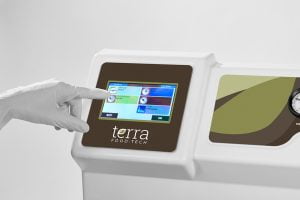
- Filling phase: the chamber is filled with water.
- Heating phase: the temperature and pressure of the water and the product are increased to the stipulated degrees.
- Sterilization phase: the sterilization temperature is maintained for the programmed time and pressure.
- Cooling phase: at the end of the sterilization phase, the product is cooled to stop the cooking process using a cold water shower (forced cooling) with a cooling-pressure ramp and draining of the water from the chamber.
These different stages will take place automatically and will be detailed on the display of the autoclave with a timer and different graphic icons. The autoclave also reports the evolution of the process, indicating whether the sterilization has been achieved.
Which food products can be sterilized in a TERRA Food-Tech® autoclave?
You can sterilize anything you want in a TERRA Food-Tech® autoclave, as long as your gourmet preserve or prepared dish contains a transfer medium such as water, oil or sauce. Examples include:
Viande: Meat dishes marinated, stewed or in sauce, pre-cooked meat dishes combined with other ingredients such as rice, vegetables, etc., soups, pâtés, cooked ham or chicken breast, beef, chicken or turkey based pet food and also baby food.
Fish: Tuna, sardines, bonito, mackerel in oil, fish pâtés, pre-cooked dishes such as salmon or red scorpionfish pie, sea bream with potato, steamed fish or peppers stuffed with tuna and cucumbers etc.
Seafood: Pickled mussels, natural cockles, scallops with garlic or in scallop sauce, baby squid in ink, octopus in olive oil, natural prawns, pâtés of king prawns, mussels, crab, scallop or sea urchin as well as seafood dishes like paella and fideuá.
Vegetables, fruit and legumes: All sorts of vegetables, fruit, beans and legumes, soups, jams, compotes, etc.
As demonstrated above, the list of foods that can be sterilized in a TERRA Food-Tech® autoclave is endless.
Did you know that the pH of food is essential for preservation and safety of gourmet preserved food and ready-to-eat meals?
The pH value indicates the hydrogen potential or potential of hydrogen ions and it is used to determine the degree of alkalinity or acidity of a specific food or any other type of solution, based on the concentration of hydrogen ions contained in the compound. Note that the pH affects the shelf life of products. Furthermore, it is a fundamental value when it comes to pasteurizing or sterilizing food, since depending on its degree of acidity or alkalinity, more or less microorganisms will proliferate.
The method for quantifying the acidity level is by the rule of less is more and more is less. That is, the more acidic a food is, the lower its pH value will be, and vice versa.
When making pH measurements, it is important to take temperature into account, since this factor also affects the acidity level of a product. Usually, samples should be taken at room temperature (20°C).
Measuring the pH in canned food and cooked meals
Both gourmet preserved food and ready-to-eat meals combine different ingredients in the same container, which means there is a pH range. This is why it is very important to know the exact acidity level of a mixture.
Did you know pH changes depending on the variety and ripeness of food? For example, the acidity level of an apple: A very ripe one is less acidic than the same unripe apple. You should keep this in mind, because your recipe of yesterday might not have exactly the same pH as the one of yesterday.
Why should you measure the pH of your food or drink?
Food pH plays an important role when it comes to pasteurizing or sterilizing a gourmet preserved food or a ready-to-eat meal because it determines the time and temperature we must expose our product in order to eliminate microbiological and enzymatic activity.
Lower temperature during a longer time will eliminate the same amount of microorganisms as high temperature during a short time, but may also cause changes in smell, color and taste of foods in a more or less significant way.
We would like to remind you that adding acidulant substances does not guarantee food preservation for long periods of time. In order to ensure proper food preservation and meet sanitary standards, it is essential to sterilize or pasteurize your product.
Food consulting regarding pH control of your preserved food or ready-to-eat meals
TERRA Food-Tech® knows how difficult it can be to measure pH of a recipe or mix of many ingredients correctly. That is why they offer you our technical and agri-food consulting service. Whatever your project is, let us know, BRS and TARRA Food-Tech will join forces to help you.
You can rely on food advice and technical support of TERRA Food-Tech®.
When you start a new recipe, it might be difficult to know how you should sterilize or pasteurize it, and in which container you should do it. Therefore, TERRA Food-Tech® offers support and can help you in your decision-making.
When you purchase an autoclave, TERRA Food-Tech offers a food consultancy service as well as an initial professional support, in which their professionals will help you to achieve the final product you want. They will guide you on the optimum times and temperatures for your preserves, and will also advise you on how to keep your preserves from changing during sterilization.
If you have any doubts about whether your product can be sterilized with your autoclave or you have any other technical questions, the TERRA Food team will be delighted to help you.

